- Home
- Colleen Nelson
Sadia Page 5
Sadia Read online
Page 5
“Mom! That’s great!”
She waved a hand at me, like I shouldn’t get too excited. “I worry about my English …” She let her words drift off.
“It’s getting better every day,” I said, switching from Arabic to English. “You just need to keep practising, speak English to us instead of Arabic.” I pulled my homework out of my backpack. Hearing Mom’s good news took some of the sting out of my day. “A new girl started today. Amira Nasser.”
“Where’s she from?”
“Homs.”
“Syria? She’s a refugee?”
“I think so.”
Mom’s face fell, her eyebrows knitted together. “Do you know anything else? Where they’re living? How many people are in their family?” The Syrian population in our city was small, but close-knit. The refugees had added a new dimension to our group of family friends. Conversation at family functions had turned away from politics and the war to what would happen to the refugees. I shook my head no to answer her questions. “Find out, will you? We can invite them over.”
Mom looked up from making dinner as I pulled the camera, tucked inside its black nylon case, out of my backpack.
“Is that the camera?” she asked.
“Yeah. I already took some photos at school.”
“Let me guess, basketball?”
I nodded. “I wish it was warmer out so I could take some of Aazim playing in the driveway.”
“Take one of Aazim studying. That’s where his energy needs to be now.”
I rolled my eyes. Mom was so predictable. Education was the number-one most important thing to my parents. Once they’d decided Aazim was going to be a doctor, Dad had determined I’d be an engineer. If he’d asked me, I’d have told him I wanted to be the next Kia Nurse and play basketball for Team Canada.
“Can I see?” she asked, coming around the counter. She had it out of the pouch before I could say no.
“Here, let me show you,” I said and took it from her before she could turn it on. The first photo was one of Mariam without her head scarf. I held it close to my chest and clicked past the incriminating shot, then passed it to her.
She grinned as I showed her pictures of basketball tryouts and the one of me that Josh had taken. She pressed the arrow button for the next picture, but instead of stopping like my iPhone did, it went back to the beginning. “Is that Mariam?” she asked, leaning closer to the camera. The three of us — me, Amira, and Mariam — looked back from the screen. Two with head scarves, one without.
Mom’s eyebrows shot up. I turned the camera off quickly. Oh boy.
“Why isn’t she in hijab?”
“Don’t say anything to her parents, okay? She’ll never speak to me again.”
“They should know.”
“Not from us.”
Mom pursed her lips. “Do you do that? Change at school?”
I shook my head. “No, never.” She gave me a searching look, as if she could tell if I was being dishonest. “Really, Mom. I wouldn’t do that.” She looked like she wanted to give me a speech about the tenets of Islam and why modesty was important, why wearing hijab mattered.
“I hope not,” was all she said. She went back to chopping onions and I looked at the photo again. I should delete the photo. Erasing the evidence would be what a good friend would do, but her snarky attitude had left a bad taste in my mouth. I kept the photo.
Chapter 8
“Hi, Amira,” I greeted her. She was waiting in the office for me, sitting across from Mrs. Mooney’s desk, holding a backpack on her lap. When she saw me, she stood up.
“Hi,” she said in English. “How are you?” Her accent was strong, but I gave her a big grin of encouragement. I remembered how scary it was to try out those first words.
“I’m good. How are you?”
She nodded. “Fine.” After that, we stood looking at each other because neither of us knew what else to say in English or Arabic.
“We can go to class,” I suggested. “Mr. Letner will let us in. He arrives early.” Amira followed me down the hallway. “Did you take photos?” I asked her, holding up my camera.
“Yes. A lot. I wish I could send the photos to the camps, so they could see what it is like here.”
I turned to her. I’d seen the camps on TV. Syrians who had left their homes but hadn’t made it across to Europe lived in settlements in Lebanon. The tents and lean-tos stretched for kilometres and the refugees lived like homeless people. Not like homeless people, they were homeless. They’d given up their homes to flee the war. Despite that, the refugees had created a life in the camps, complete with makeshift schools, restaurants, and shops. “That’s where you were?”
“For almost a year.”
I imagined what this school, with its clean, orderly desks and healthy, well-fed students, must feel like for her. “Then we were in a hotel for a month, waiting for a place to live in Winnipeg.”
“How many people are in your family?”
“Seven. I am the oldest. I have four younger brothers.”
I looked at her, incredulous. “Four little brothers.” It would be her responsibility to look after them.
“Who watched them when your parents came with you yesterday? Or were they at school?”
“The littlest one is only two, but Omar, Sami, and Yussef start school next week, so a worker came over. She comes to visit us, teaches us to do things, shows us things. She’s bringing a TV today. I can’t wait.” It was the first time I saw a flicker of life cross her face.
“Can I see your photos?” I asked. She gave me a wary look, like a skittish cat. “Here, I’ll show you mine,” I offered.
I’d taken a lot around the house yesterday. Close-ups of my family, including one of my dad snoring in a chair as he slept through the news, my room, and the prayer mat in the dining room with the early evening sun streaming through. The last picture was of my basketball shoes, dirty and crumpled, with the laces hanging limp, as if they were exhausted from overuse. I smiled as I showed it to her. “That’s my favourite.”
“You are a big fan of basketball?”
“Yes! What about you? Do you play?” The haunted look she had when I’d met her yesterday returned. She shook her head.
“In Homs, the army planted bombs around the playground.”
“Oh.” The smile on my face disappeared. I’d left years before her, but it may as well have been a lifetime. The Syria I remembered was nothing like the one she’d been living in.
“Hi, girls.” Mr. Letner motioned for us to come inside the class. “Amira,” he gave her an extra-big smile, but she ducked and sat down in the chair beside my spot. I shrugged at Mr. Letner as if to say, What can we do? and sat down.
Mr. Letner had booked lab time so we could download and edit our photos. I’d already decided that no matter how Mariam acted toward me, I’d pretend things were fine between us. Maybe her rude behaviour was a phase and she’d be back to the old Mariam soon.
But not soon enough. She walked in again without hijab, wearing another one of Carmina’s shirts, one of those long-sleeved, close-fitting athletic ones that I sometimes wore under a looser shirt. She’d put her hair up in a ponytail and was wearing stretchy, black pants and tall, black boots. I had to admit, the outfit looked good on her, and it looked comfortable. For a second, I wondered how it would feel to play basketball wearing an outfit like that — well maybe not with the boots.…
Mariam sat down and didn’t say hello to me or Amira. Her icy silence tempted me to wave my hands in her face and act like an idiot just to annoy her. Instead, I concentrated on helping Amira by pointing at things in the classroom and saying the English word. Mr. Letner gave me a thumbs-up. Josh walked in just before the bell. I carefully avoided his gaze. The more I’d thought about Allan’s comment, the more I wondered what Josh really thought about me. He could have stuck up for me and to
ld Allan that we were friends, but he hadn’t. I think I was more hurt by his betrayal than by what Allan had said.
Carmina and Mariam kept writing notes to each other and passing them under the desk. I tried to ignore them, but I couldn’t help wondering if they were about me. Every time they stifled a giggle, I sat up straighter, focusing on Mr. Letner, or helping Amira make sense of what he was saying. I was determined not to let Mariam get to me.
“Now that you’ve all got some photos, we can go to the computer lab and start playing around with effects using Photoshop.” He took a photo he’d taken of trees in a field and demonstrated. First, he changed the whole photo to black and white. Next, he showed us how to crop the photo so only the most important things were included, like the trees. Then, he zoomed in and enlarged the trees so they took up the whole frame. He brightened the sky and darkened one tree so it stood out against the grass. By the time he was done, the photo was a piece of art.
“Select the photos you want to upload, then play around with them. When you have one you want to share, save it in our shared student drive and you can present it to the class.”
The computer lab was noisy as everyone showed each other their photos. I worked quietly, sorting and editing my pictures but it was hard not to peer over Amira’s shoulder to see what she was working on. Mr. Letner walked around, helping kids who needed it. Despite my feelings toward Josh, I’d chosen the photo he had taken of me holding the basketball. I knew it would annoy Mariam to see it on the Smartboard screen, but I didn’t care. It was my favourite one. I liked that it made me look strong. Not your stereotypical Muslim girl, that’s for sure. Plus, the grin on my face stretched ear to ear. I changed it to black and white, cropped the background, and enlarged the image so the basketball was in the centre of the frame. From across the lab, Carmina and Mariam were oohing over each other’s photos. Mariam and I should be doing that, I thought. Why weren’t we? Was it just because of the hijab? Or Josh? Or maybe, and this part was hard to think about, we really were growing apart.…
“Sadia?” Amira turned her screen so I could see her photo. “Can you help me?” she asked in Arabic.
I realized she didn’t know what any of the English words meant on the screen, so for the last thirty minutes, she’d been randomly moving the mouse around, trying to make something happen. I translated the words and showed her what each icon did.
Mr. Letner came around again and congratulated me on my photo. “Save it to the shared drive. I’ll show it to everyone when we’re back in the classroom.”
I thought again of Mariam and what she’d say when my smiling face came up on the screen. She’d know it was the photo Josh had taken of me. Did I really want to make things worse between us? “No,” I said, shaking my head. I’d changed my mind. “I don’t want to share it.”
Mr. Letner frowned. “Really? You did a great job on it.”
I shook my head again. He sighed. “Okay.”
On Amira’s screen was a new photo. She’d taken it at a grocery store. In her hand was an orange, and behind the one she was holding, a pyramid of a hundred more. “Orange,” I said, without thinking.
“Yummy,” she said in perfect English.
I smiled at her.
She continued in Arabic: “We had an orange tree in our yard. I used to pick them to eat for breakfast.” We’d had a fig tree on our balcony in Syria. There was no better treat than a sun-warmed fig melting on my tongue. It had been years since I’d had one, but the taste and feel of them flooded back to me.
“The tree is dead now,” she said with finality. I looked at her, alarmed. But there was no emotion on her face. Was it dead because no one was there to look after it, or for another reason?
“Amira,” I started, prepared to say something to let her know I understood how hard moving to a new country was: the homesickness and feeling like she didn’t belong. But as I opened my mouth, Mr. Letner drew our attention back to him.
“Okay, everyone. Save your work and log off. We’ll continue this tomorrow. Remember, keep taking pictures. I really like what I’ve seen so far.”
I showed Amira how to save her photos. I took an extra-long time to make sure that Mariam and Carmina had left the lab before I stood up to leave. “Lunch?” Amira asked in English.
“You’re staying?”
She nodded.
“I have basketball tryouts,” I told her. “You can come.”
She shook her head and looked at the floor. “No, I don’t think so.”
“Why not?”
Amira shrugged. “I don’t know the game.”
If she’d said she hated basketball, I would have let it go. You can’t force someone to love a sport. But not knowing how to play? That part, I could fix.
Chapter 9
The pimpled rubber of the basketball lay under my fingers. I bounced it once. Hand, floor, hand. “See?” I showed Amira. “Easy.”
She dropped her ball and caught it. “Easy.”
I dropped my ball, dribbled it twice, and caught it. Amira dropped her ball, but she held her hand too flat and got no bounce. It rolled into her toe. She grimaced at me. “Try again,” I told her. This time, I showed her how to push her hand against the ball so it would rebound off the floor. She had to chase it to keep the dribble going, but she got six bounces in a row before she lost it.
“Okay, now, a bounce pass.” She put her ball down. I sent my ball to her with a gentle bounce. She caught it and grinned at me. “Nice!” We went back and forth like that for a while. “Try this: dribble, dribble, dribble, bounce pass.” The first two tries were fails, but the third one she did perfectly. As kids started to arrive for the tryouts, I thought Amira would be too embarrassed to keep playing, but I was wrong. It made me wonder if the shy girl who’d arrived at school was the real Amira.
“Hey,” Josh called, walking over. Startled by his voice, Amira missed the pass and the ball bounced past her. I ignored him and waited for Amira to get the ball. “Sadia?” he said tentatively.
“What?”
“Are you okay?”
I set my mouth and refused to look at him.
“Cuz I thought we could practise our free throws —”
Mariam walked over to us from the gym doorway. “Is it three throws or free throws?” She knew the right term, and it made me grit my teeth hearing her act dumb to get Josh’s attention.
“Free throw,” Josh said.
“Oh,” she said as if he’d just explained nuclear fission to her. For the first time, she noticed Amira standing beside me. “Is she trying out, too?” she asked incredulously.
I didn’t bother to answer and rolled my eyes at Mariam. She could have asked Amira herself in Arabic.
It was almost time for tryouts to begin, so I explained to Amira that she could wait on the bench for me while I went to get changed. I was relieved to walk away from both Josh and Mariam, although I did wonder why Josh had asked to practise his free throws with me instead of Jillian.
When I came out of the change room, Amira was sitting on the bench and Mariam was talking with Mr. Letner. She had her all-business face on, which meant she was determined and wouldn’t take no for an answer. She’d convinced my parents into many sleepovers using that face. I wondered what she wanted from Mr. Letner.
I adjusted my hijab and ran onto the court. Jillian did a layup and the ball rebounded off the backboard and straight into her hands. She took another shot: it rolled around the rim and down, but I was underneath the basket and lunged for it. I caught the ball and felt it slap against my palm. I took a breath and aimed. The ball sailed in. I could lose myself in playing, the squeak of runners on the shellacked floor and the echo of the ball against the cement walls. Even the smell of rubber was comforting. While I played, I could forget about Josh and that my supposed best friend was turning into someone I didn’t know. Someone I didn’t even want to
know.
Mr. Letner had promised us that he’d announce who was making the team by the end of the next day. I got butterflies thinking about it. We’d have a few weeks to practise before the tournament. It would mean giving up lunch hours and maybe some early mornings. “Good practice,” he said to me as we walked back to the classroom. “I noticed Amira was watching. Does she play?”
“She’s just learning,” I told him.
“I really like how you’ve taken her under your wing, Sadia. Thanks.”
I shrugged off his compliment, but it made me feel good to know that at least he’d noticed.
“I thought Mariam might help out, too.”
I tried to keep my expression the same at the mention of her name.
“I noticed she’s not wearing her head scarf anymore.” He gave me a long look before we turned into the hallway.
All the things I wanted to say bubbled up in my throat. “She still does around her parents,” I said. “Just not at school.”
“How’s that sit with you?”
I shrugged. What could I say? That I hated it and wanted to duct tape the hijab back on her head? “If her parents found out, they’d be really mad.”
“Sounds like you’re in a tough spot.”
I waited for Mr. Letner to give me some brilliant wisdom, but all he did was gently slap my shoulder and tell me to hurry up and get my books or I’d be late for class.
I was at my locker when I heard “Sadia!” from down the hallway. It was Josh, but I ignored him and quickly stashed my gym bag and basketball shoes. I wasn’t fast enough, though, and when I shut the locker door, Josh was on the other side of it.
He ran a hand through his damp hair, pushing it off his forehead. “Did I do something to piss you off?” he asked.
Being honest about what I’d overheard would have been the smart thing to do, but the hurt I’d felt when he agreed with Allan made being smart impossible. Anger at Mariam and her stupid de-jabbing bubbled up, too, and before I could stop myself, words spewed out of my mouth like a verbal volcano. “Mariam likes you,” I blurted. “I know she’s no Jillian Triggs, but hopefully she’s not a waste of time like I am.” I turned on my heel to walk away before he could see the blush spreading across my face.

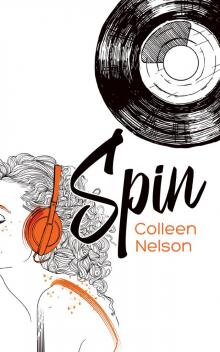 Spin
Spin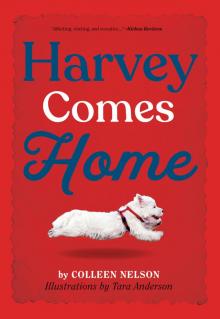 Harvey Comes Home
Harvey Comes Home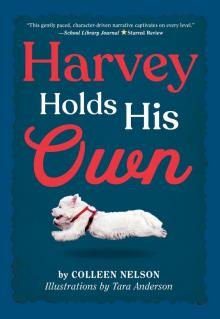 Harvey Holds His Own
Harvey Holds His Own Pulse Point
Pulse Point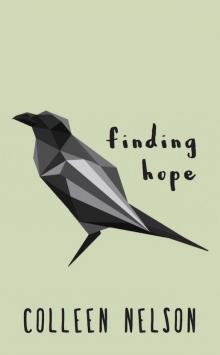 Finding Hope
Finding Hope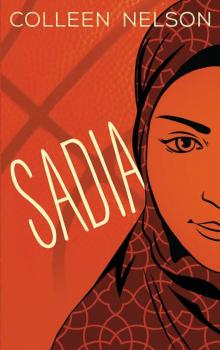 Sadia
Sadia Blood Brothers
Blood Brothers